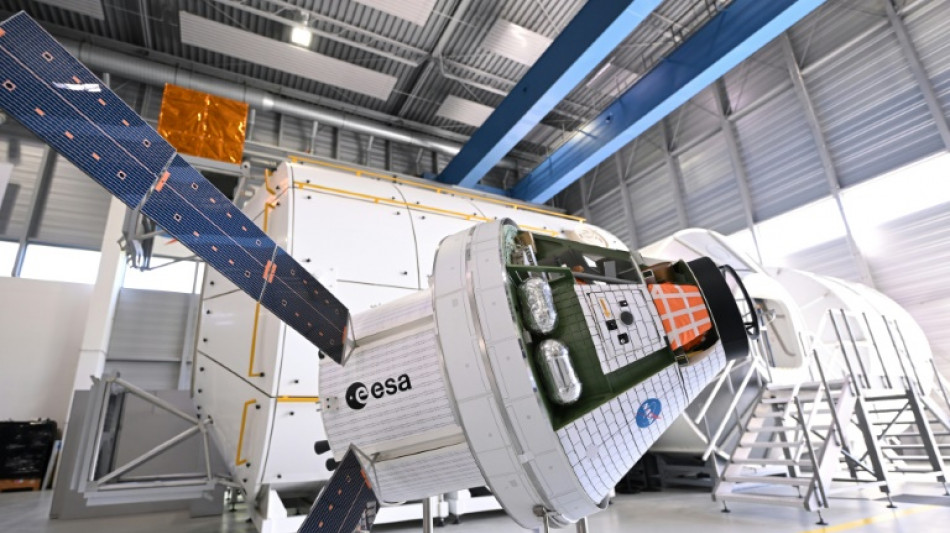
-
 Asian markets rally with Wall St as rate hopes rise, AI fears ease
Asian markets rally with Wall St as rate hopes rise, AI fears ease
-
Jailed Malaysian ex-PM Najib loses bid for house arrest

-
 Banned film exposes Hong Kong's censorship trend, director says
Banned film exposes Hong Kong's censorship trend, director says
-
Duffy, Patel force West Indies collapse as NZ close in on Test series win

-
 Australian state pushes tough gun laws, 'terror symbols' ban after shooting
Australian state pushes tough gun laws, 'terror symbols' ban after shooting
-
A night out on the town during Nigeria's 'Detty December'

-
 US in 'pursuit' of third oil tanker in Caribbean: official
US in 'pursuit' of third oil tanker in Caribbean: official
-
CO2 soon to be buried under North Sea oil platform

-
 Steelers edge Lions as Bears, 49ers reach playoffs
Steelers edge Lions as Bears, 49ers reach playoffs
-
India's Bollywood counts costs as star fees squeeze profits

-
 McCullum admits errors in Ashes preparations as England look to salvage pride
McCullum admits errors in Ashes preparations as England look to salvage pride
-
Pets, pedis and peppermints: When the diva is a donkey

-
 'A den of bandits': Rwanda closes thousands of evangelical churches
'A den of bandits': Rwanda closes thousands of evangelical churches
-
Southeast Asia bloc meets to press Thailand, Cambodia on truce

-
 As US battles China on AI, some companies choose Chinese
As US battles China on AI, some companies choose Chinese
-
AI resurrections of dead celebrities amuse and rankle

-
 Steelers receiver Metcalf strikes Lions fan
Steelers receiver Metcalf strikes Lions fan
-
Morocco coach 'taking no risks' with Hakimi fitness
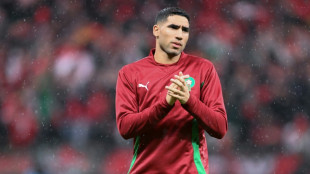
-
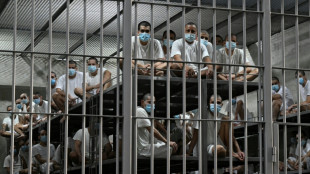 Gang members given hundreds-years-long sentences in El Salvador
Gang members given hundreds-years-long sentences in El Salvador
-
Chargers, Bills edge closer to playoff berths

-
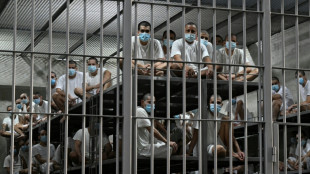 Gang members given hundred-years-long sentences in El Salvador
Gang members given hundred-years-long sentences in El Salvador
-
Hosts Morocco off to winning start at Africa Cup of Nations

-
 No jacket required for Emery as Villa dream of title glory
No jacket required for Emery as Villa dream of title glory
-
Amorim fears United captain Fernandes will be out 'a while'

-
 Nigerian government frees 130 kidnapped Catholic schoolchildren
Nigerian government frees 130 kidnapped Catholic schoolchildren
-
Captain Kane helps undermanned Bayern go nine clear in Bundesliga

-
 Captain Kane helps undermanned Bayern go nine clear
Captain Kane helps undermanned Bayern go nine clear
-
Rogers stars as Villa beat Man Utd to boost title bid

-
 Barca strengthen Liga lead at Villarreal, Atletico go third
Barca strengthen Liga lead at Villarreal, Atletico go third
-
Third 'Avatar' film soars to top in N. American box office debut

-
 Third day of Ukraine settlement talks to begin in Miami
Third day of Ukraine settlement talks to begin in Miami
-
Barcelona's Raphinha, Yamal strike in Villarreal win

-
 Macron, on UAE visit, announces new French aircraft carrier
Macron, on UAE visit, announces new French aircraft carrier
-
Barca's Raphinha, Yamal strike in Villarreal win

-
 Gunmen kill 9, wound 10 in South Africa bar attack
Gunmen kill 9, wound 10 in South Africa bar attack
-
Allegations of new cover-up over Epstein files

-
 Atletico go third with comfortable win at Girona
Atletico go third with comfortable win at Girona
-
Schwarz breaks World Cup duck with Alta Badia giant slalom victory

-
 Salah unaffected by Liverpool turmoil ahead of AFCON opener - Egypt coach
Salah unaffected by Liverpool turmoil ahead of AFCON opener - Egypt coach
-
Goggia eases her pain with World Cup super-G win as Vonn takes third

-
 Goggia wins World Cup super-G as Vonn takes third
Goggia wins World Cup super-G as Vonn takes third
-
Cambodia says Thai border clashes displace over half a million

-
 Kremlin denies three-way US-Ukraine-Russia talks in preparation
Kremlin denies three-way US-Ukraine-Russia talks in preparation
-
Williamson says 'series by series' call on New Zealand Test future

-
 Taiwan police rule out 'terrorism' in metro stabbing
Taiwan police rule out 'terrorism' in metro stabbing
-
Australia falls silent, lights candles for Bondi Beach shooting victims

-
 DR Congo's amputees bear scars of years of conflict
DR Congo's amputees bear scars of years of conflict
-
Venison butts beef off menus at UK venues

-
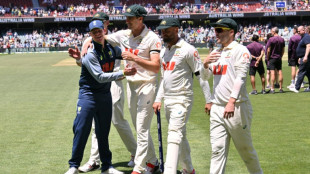 Cummins, Lyon doubts for Melbourne after 'hugely satsfying' Ashes
Cummins, Lyon doubts for Melbourne after 'hugely satsfying' Ashes
-
'It sucks': Stokes vows England will bounce back after losing Ashes
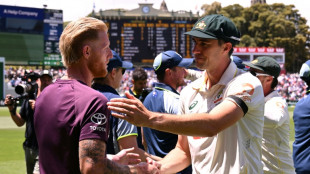

Prep in the pool for Europe's next astronauts
A new cohort of astronauts at the European Space Agency's training centre in Cologne, Germany, can expect to see time in both the pool and the classroom as they get ready to head into orbit.
Trainees dive into the water to emulate the experience of working in zero gravity, as well as studying a variety of subjects from medicine to geology.
The aim of the curriculum is to prepare the group for service on the International Space Station (ISS) and later on a potential mission to the moon.
"The biggest challenge is to learn so many different things in a very short period of time," British astronaut Rosemary Coogan, 31, told AFP in an interview.
Along with four other hopefuls, Coogan in April began the 13-month course and will have finished by May 2024.
By then, the group will know who among them will be the first to climb aboard the low-orbit station in 2026.
For French candidate Sophie Adenot, 40, the "variety of the training" is part of the pleasure.
"It is everything from theoretical science to operational training. I am astounded by everything we have done in the last month," she told AFP.
Graduates from the course could be headed for the moon, in the scope of the Artemis mission, which hopes to return astronauts to the rock within a decade and to establish a permanent base on Earth's natural satellite.
- Woman on the moon -
The current cohort of astronauts includes the highest number of women to date after a push by the ESA to make space travel less masculine.
The agency encouraged more women to apply for the opportunity to go to space. In all, almost a quarter of candidates in 2021 were women, up from 15 percent in the last round in 2008.
"More than just having women in the team, what is important is diverse backgrounds and professions," said Adenot.
"A doctor will have a different way of thinking than an engineer or a pilot... it's important to have various ways of thinking in the team," she said.
Adenot, herself a helicopter test pilot, is joined in the group by Swiss doctor Marco Sieber, Belgian neuroscientist Raphael Liegeois and Spanish aeronautical engineer Pablo Alvarez Fernandez.
In addition to the five candidates, the ESA has also appointed a "parastronaut" -- an astronaut with a handicap -- 41-year-old Briton John McFall, who will take part in the training.
McFall's presence will allow the ESA to study the feasibility of sending an astronaut with greater physical limitations into space.
- Pool time -
The training course seeks to prepare the future astronauts for any situation they could be confronted with in space.
In the pool, 10 metres underwater, the team practice what to do if a colleague falls ill in space and how to communicate with them.
"Astronauts have to have a very sound judgement," said Coogan.
"When you get to space, there are often very unpredictable things and it can be to do with your day-to-day activities or an emergency situation. And that’s where you need to stay calm."
After 13 months of training, only the candidate chosen to go to the ISS will begin a separate two-year programme tailored to the mission.
Despite the limited space onboard the rocket, the team at the ESA work well together.
"We are like a team of highly trained athletes. The demands of space missions are so high that you can only match them by working together," said Adenot.
"When one of us is selected for a mission, whether it is on the International Space Station or the moon, we will all be behind them."
Ch.Havering--AMWN



